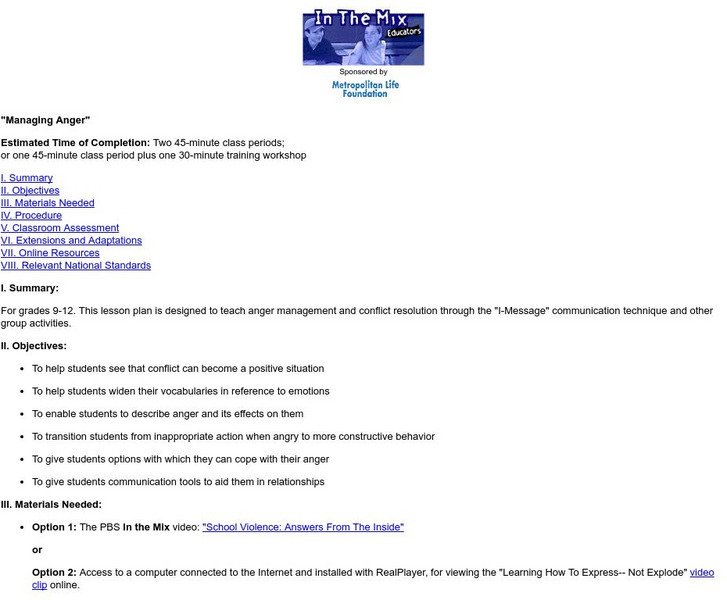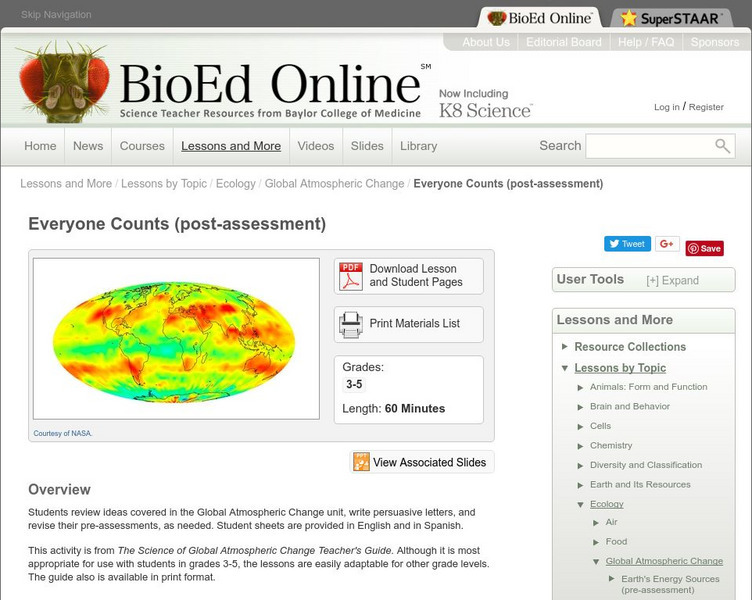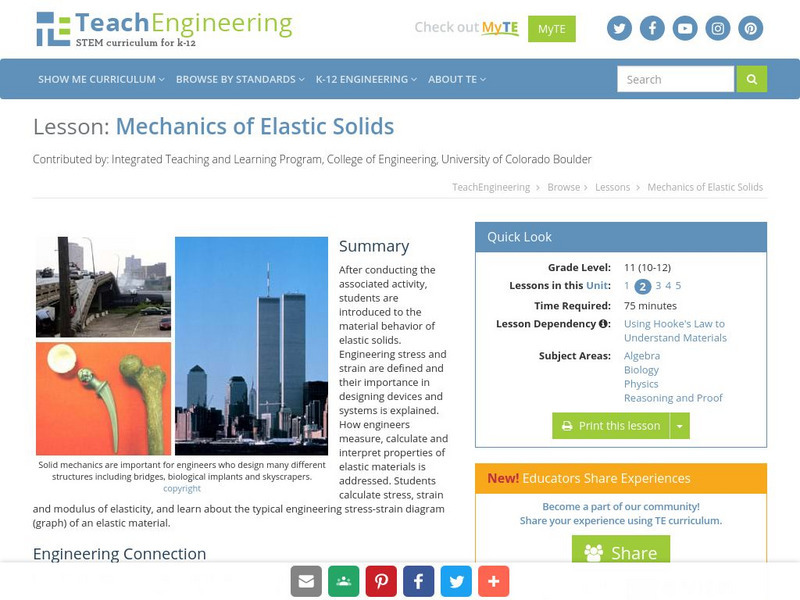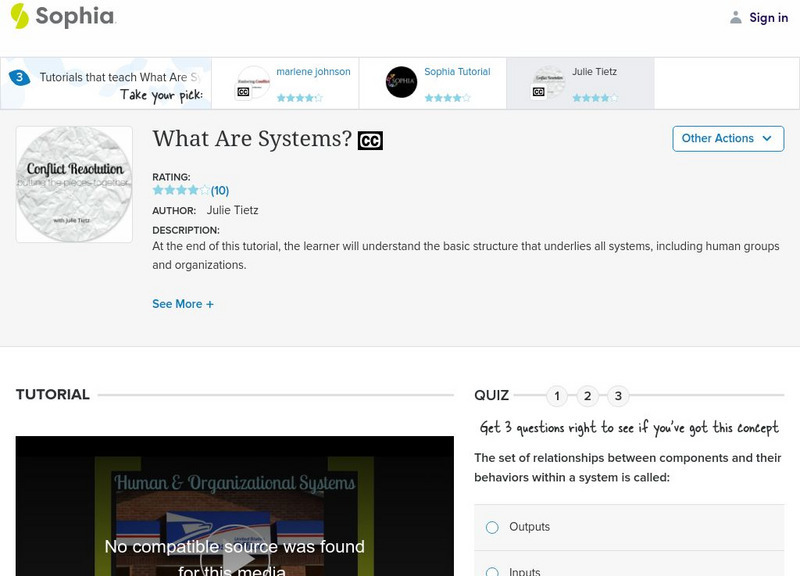Hi, what do you want to do?
Curated OER
Thanksgiving
First graders examine the reasons for the Thanksgiving celebration in the United States. They research information about what type of items were used in the past and items that are currently used. They investigate life on the Mayflower...
Curated OER
Nutrition and the Food Pyramid
First graders examine the food pyramid and how healthy food effects the body. They discuss what they ate for breakfast and identify what makes a food healthy. Students analyze the food pyramid, and cut out magazine pictures of food and...
Curated OER
Germs
First graders discuss as a class how many of them have sneezed today. They then listen as the teacher explains that germs come out of their nose during a sneeze or when they blow their nose. They then discuss other ways that a person...
Curated OER
Diabetes
Students use maps, phone books and newspapers to determine how much health information and health services exist within their home, school and community regarding Type 2 Diabetes. Students review the available information.
Curated OER
If We Knew Then What We Know Now -- Cuban Missile Crisis (Background)
Students examine the background of the Cuban Missile Crisis. Using the foreign policy decision-making process, they simulate and elaborate the processe involved. They identify the causes of the misconceptions that plagued the U.S.-Cuba...
Curated OER
Graphs
Students create "snowballs" from crumbled pieces of white paper. They then glue their snowball to the appropriate side of the graph to indicate who has and who has not thrown a snowball. The teacher and the calss then will count how many...
Curated OER
Real Attractive
Sixth graders create a collage of attractive people. They write about what makes these people attractive. They discuss what makes someone attractive. They research eating disorders and how the media impacts what people deem as attractive.
Curated OER
Native American Poetry
Fourth graders locate the poetry section of the LMC. They produce a hand written transparency based on the poem Hiawatha by Henry Wadsworth Longfellow. Students illustrate a poem from their poetry section. It is a mystery to them what...
Curated OER
Measurements
Third graders brainstorm a list how they use measurements everyday. Using string, they cut a piece long enough as their height and complete ratios using their arms and legs about old tales about measurements. They compare and contrast...
Curated OER
P.E. Bees
Students learn daily positive social living skills and manners using 2 large bee pictures and 36 or so small bees with diferent sayings on them.
Curated OER
Mental Disorder T-shirts
High schoolers develop a better understanding of mental health and the different types of disorders that people may experience. They create T-shirts that explain and display their learning about a specific disorder.
Curated OER
Responding to Social Crisis
Pupils, through discussion, identify ways to cope with and process unexpected community or world crisis, such as terrorism or violent acts within a school or community.
Curated OER
How Did We Arrive at the Printed Book?
Seventh graders, in cooperative learning groups, research the development of book printing. After examining a story written on a scroll, an accordion book, and a printed copy, they evaluate them according to a certain criteria and...
Curated OER
Rap-Tap-Tap
Fifth graders investigate incline planes and wedges. They identify a variety of incline planes and wedges that are found all around them. Students record their findings using a worksheet.
PBS
Pbs Teachers: Managing Anger
Reflect on what makes one angry and how one responds to anger. Practice anger management and conflict resolution through the "I-Message" communication technique and other group activities.
BioEd Online
Bio Ed Online: Everyone Counts (Post Assessment)
A post-assessment at the end of a unit on global atmospheric change. Students write persuasive letters about an issue related to it, e.g., the greenhouse effect or ozone loss. The letters encourage the recipient to protect the atmosphere...
Committee for Children
Second Step: Grade K: Lesson 16: Managing Danger
This parent resource accompanies Second Step: GRADE K: Lesson 16: Managing Danger. Parents should reinforce to their children that feeling angry is natural but that hurtful, mean behaviors are not okay.
Common Sense Media
Common Sense Media: Education: Lesson: Follow the Digital Trail: K 2
Students learn that the information they put online leaves a digital footprint or "trail." This trail can be big or small, helpful or hurtful, depending on how they manage it. Free membership required.
Alabama Learning Exchange
Alex: Lesson Plan: Calendar Fun Operations
This lesson allows students to practice evaluating expressions using order of operations. They will create a calendar using symbols, and a PowerPoint presentation to review the order of operations. It also gives an assessment and ideas...
Sophia Learning
Sophia: Ripple Effects in Systems: Lesson 1
At the end of this tutorial, the learner will understand a change of behavior or components in one point of a system will cause changes throughout the system as whole. It is 1 of 3 in the series titled "Ripple Effects in Systems."
Sophia Learning
Sophia: The Amygdala and Fight/flight Reaction: Lesson 2
At the end of this tutorial, the learner will understand how the brain structure called the amygdala impacts people's behavior when they are in conflict. It is 2 of 3 in the series titled "The Amygdala and Fight/Flight Reaction."
TeachEngineering
Teach Engineering: Mechanics of Elastic Solids
After conducting the associated activity, students are introduced to the material behavior of elastic solids. Engineering stress and strain are defined and their importance in designing devices and systems is explained. How engineers...
TeachEngineering
Teach Engineering: Viscoelasticity
Learners are introduced to the concept of viscoelasticity and some of the material behaviors of viscoelastic materials, including strain rate dependence, stress relaxation, creep, hysteresis and preconditioning. Viscoelastic material...
Sophia Learning
Sophia: What Are Systems?: Lesson 2
At the end of this tutorial, the learner will understand the basic structure that underlies all systems, including human groups and organizations. It is 2 of 3 in the series titled "What are Systems?."



























